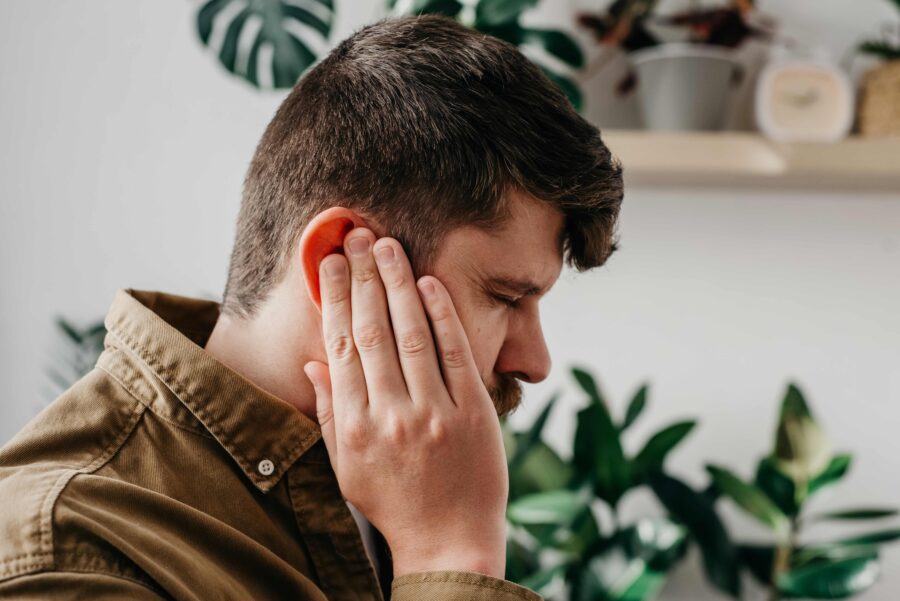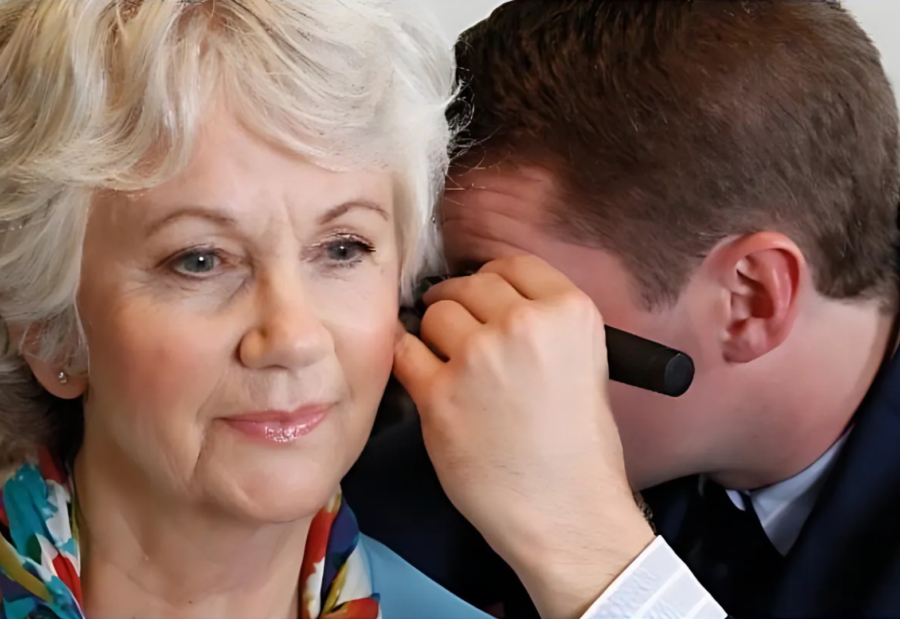Blog post
Tinnitus: What it is, Causes, Treatments, Hereditary Factors, Diagnosis
What is tinnitus?
Tinnitus is the perception of noise or ringing in the ears. In many cases, tinnitus is associated with some degree of hearing loss, but this may not always be the case.
There are different types of tinnitus:
- Subjective tinnitus: This is the most common type of tinnitus, and it can only be heard by the person who has it.
- Musical tinnitus: This is a type of tinnitus in which the person hears music or musical sounds in their ears or head when there is no external noise present. It is most common in people with a severe hearing loss.
- Pulsatile tinnitus: This is a type of tinnitus in which the person hears a rhythmic sound, such as a heartbeat or a pulse. It is often caused by a blood vessel problem.
- Somatic tinnitus: This is a type of tinnitus that is caused by a physical problem outside of the auditory system, such as neck or jaw muscle tension.
- Tinnitus secondary to a medical condition: This is a type of tinnitus that is caused by an underlying medical condition, such as Ménière's disease, otosclerosis or head injury.
- Objective tinnitus: This is a less common type of tinnitus, and it can be heard by both the person who has it and by other people. It is caused by a physical problem outside of the auditory system, such as a blood vessel problem or a muscle spasm.

What does tinnitus sound like?
Tinnitus can cause a variety of sounds, including ringing, buzzing, whooshing, whistling, pulsating and roaring. It can be experienced in one or both ears.
"The best way for me to describe the sounds is a low humming/ringing sound, like the sounds of a factory in the distance. It increases and decreases in intensity which makes you listen more intently for variances and the intervening moments of silence."
- Individual with tinnitus
How common is tinnitus?
Tinnitus is one of the most common hearing conditions that people experience – approximately one in ten UK adults will have persistent tinnitus.
The risk of tinnitus increases with age, with people over 60 being two to three times more likely to experience it.

What causes tinnitus?
There are many potential causes of tinnitus, some of the most common ones include:
- Noise trauma – damage to the inner ear from exposure to very loud sounds such as shooting, chain saws, aircraft engines or excessively loud music.
- Physical injury: a blow to the head, or changes in barometric pressure during air travel or diving.
- Ear diseases or infection: e.g. otosclerosis (a condition in which the bones in the middle ear don’t vibrate properly), Meniere’s disease (a build-up of fluid in the inner ear) or acoustic neuroma (a non-cancerous, benign tumour that grows on the vestibular nerve)
- Problems with the auditory system: when sound waves enter the ears, they travel through the ear canal and cause the eardrum to vibrate. The vibrations of the eardrum are then transmitted to the inner ear, where they are converted into electrical signals. These electrical signals are then sent to the brain, where they are interpreted as sound. In people with tinnitus, it is thought that the auditory system is not working properly.
- Narrowing or abnormal blood vessels: This can cause the blood vessels in the head and neck to constrict, which can lead to whooshing or pulsating sounds in the ears.
- Teeth clenching and grinding (bruxism): This can cause clicking and popping sounds in the ears.
- Neck and head muscle movements: This can cause muscle spasms in the neck and head, which can lead to clicking and popping sounds in the ears.
- False smiles: This can cause the muscles in the jaw and neck to tense up, which can lead to clicking and popping sounds in the ears.
- Earwax blockage: blockages can result in a lack of room to allow sounds to be filtered correctly which can contribute to tinnitus.
- Circulatory changes or high blood pressure
- Thyroid problems
- Allergies
- Diabetes
- Diet
- Stress
- Covid-19 – it’s been reported that Covid-19 can make tinnitus worse.
How long does tinnitus last?
Usually, tinnitus only lasts for a short period. It is common for tinnitus to fluctuate with stress and tiredness, with no harmful significance.
However, sometimes tinnitus can be persistent. Around 1% of people suffer with severe, troublesome tinnitus that is recognised as a major affliction.

How to treat tinnitus
A common myth is that there's nothing you can do about tinnitus. The truth is, there are a number of things you can do to lessen the severity of the tinnitus including:
- Wear hearing aids: When hearing loss and tinnitus are present together, hearing aids alone can be very beneficial, providing relief from tinnitus. Hearing aids amplify environmental sounds that can make tinnitus less noticeable. Additionally, hearing loss can lead to stress, and stress can result in tinnitus.
- Tinnitus retraining therapy (TRT): this is a therapeutic approach that combines sound therapy and counselling to help individuals habituate to their tinnitus, making it less noticeable and bothersome over time.
- Cognitive behavioural therapy (CBT) for tinnitus: this can help to change thoughts and behaviours about tinnitus. It is based on the idea that our thoughts and feelings can influence our physical sensations. It has been shown to be an effective treatment.
- Avoiding loud environments: many people will find their tinnitus is aggravated by noise and should avoid noisy situations or wear ear protection if practicable.
- Minimise stress and fatigue: these should be avoided as much as possible and always try to get adequate sleep and relaxation.
- Check medication: tinnitus can be a side effect of some medication. Anti-inflammatory drugs, quinine and aspirin among many others. If you are on any medication, you should check with your doctor in case an alternative treatment is available.
- Lowering salt intake: this, plus a balanced diet, is beneficial.
- Exercise daily: this will improve circulation.
- Manage blood pressure: your blood pressure should be checked and measures taken to lower it if necessary.
- Avoid nicotine, caffeine, recreational drugs and alcohol: most people with tinnitus find that it is aggravated following any form of intoxication.
- Widex Zen therapy: This is a programme that is built into Widex hearing aids combining sound stimulation, counselling, stress reduction and amplification to help dull the annoying hum of tinnitus. It can help you reduce stress, overcome sleep difficulties and reduce overcompensation by the brain because of hearing deficits.
"I use Tinnitus Retraining Therapy (TRT) which teaches the sufferer to ignore the noise, combined with deep relaxation and stress management. The object of this, for me, is to eliminate the anxiety that the tinnitus causes; ultimately diverting the concentration away from the tinnitus noise."
- Individual with tinnitus
Is tinnitus hereditary?
Tinnitus can be hereditary. However, it is important to note that not everyone who has a family history of tinnitus will develop it themselves.
There are a number of different genes that have been linked to tinnitus. Some of these genes are involved in the development and function of the inner ear. Others are involved in the processing of sound in the brain.

Can tinnitus cause dizziness?
Tinnitus itself generally does not cause dizziness, but both symptoms can occur as part of a larger syndrome or condition.
For example, Meniere's disease is characterised by episodes of severe dizziness (vertigo), hearing loss and tinnitus. Another condition, vestibular migraines, can also result in both tinnitus and dizziness among its symptoms.
If you experience both tinnitus and dizziness, it's important to consult a healthcare professional for an accurate diagnosis and appropriate treatment plan. These symptoms could be indicative of an underlying issue that may require medical attention.
How is tinnitus diagnosed?
If you suspect that you have tinnitus, your first step is to undergo a professional evaluation. Get in touch with us to book your free tinnitus assessment with our Hearing Aid Audiologists.
An Audiologist can assess your hearing and provide more information on tinnitus.

Can tinnitus be cured?
The potential for tinnitus to go away depends on its cause.
If tinnitus is the result of a short-term exposure to loud noise (like attending a loud concert), it often goes away within hours to days.
Prolonged exposure to loud sounds can lead to damage in the inner ear, which might cause tinnitus. Such tinnitus can be persistent, but its intensity can sometimes decrease over time.
If tinnitus is a result of a treatable underlying issue, then treating the issue will often cure the tinnitus as well.
In the case of earwax, for instance, once the wax is removed, the tinnitus typically goes away.
Tinnitus that has been persistent for a long time (usually more than six months) might not completely go away. However, its perception can be reduced with hearing aids, or individuals can become habituated to it, making it less bothersome.
Tinnitus can be a symptom of presbycusis or age-related hearing loss. In such cases, while hearing aids may alleviate some of the perceived tinnitus, it might not completely go away. Get in touch with us if you’re interested in getting hearing aids.
Some medications cause tinnitus as a side effect. In these instances, tinnitus usually ceases when you stop taking that medication. Always follow your GP’s instructions when it comes to medication, and consult with them about any side effects.



